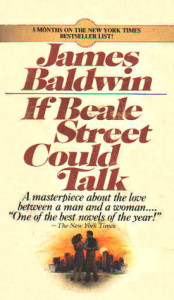This is a story of young love up against a society determined to keep them apart, yet it’s a story like none you’ve heard before. Tish, 19 years old, and Fonny, 21, have known each other most of their lives, friends first, then lovers, and now pledged to marry. However, in 1970s New York, like today, it can be a crime to be black. Fonny has been jailed for raping a Puerto Rican woman, framed by a white policeman who was still smarting from an earlier encounter with Fonny.
It’s also a story of family, the strength of black families despite the stereotypes that tell you otherwise. Tish’s family not only supports her in her pregnancy but love Fonny as a son, and all—mother, father and sister—join forces to find a way to get him out of jail. Fonny’s family is dominated by his self-righteous mother who believes her religion puts her above others.
It was like there was nothing, nothing, nothing you could ever hope to say to her unless you wanted to pass through the hands of the living God: and He would check it out with her before He answered you.
Fonny’s sisters follow their mother’s lead and there are wonderful snarky scenes between them and Tish’s sister. However, Fonny’s father Frank defies his womenfolk and puts himself on the line to help his son.
“It’s a miracle to realize that somebody loves you.” This is Tish talking about her beloved, but it is also true of the gift of familial love. You can’t take it for granted. One of my friends is concerned about the lack of stories—books, movies, television, news articles—about the strong bonds of love within black families like her own. Something to set against the flood of stories of gangsters and drug dealers, the abused and the abusers. Here is one such story.
I guess it can’t be too often that two people can laugh and make love, too, make love because they are laughing, laugh because they’re making love. The love and the laughter come from the same place: but not many people go there.
Tish’s voice conveys love in a fresh, unsentimental way. It reflects her hard-won understanding of how the world works: when to speak up against injustice, when to just keep going; how to hold onto dreams without getting lost in them. In giving us Tish’s inner thoughts, Baldwin expertly navigates the steady heartbeat of being black in America, almost never shouting, letting the events speak for themselves.
This is also a story about prison and what it does to a man, not just Fonny unjustly locked up, but also his childhood friend Daniel. Only recently released from prison on a charge of which he was innocent, though guilty of holding weed, Daniel is a shadow of his former self. Unfortunately, as Fonny’s alibi, he is also the target of the white policeman determined to make sure Fonny goes down.
The structure of the story reflects another of Baldwin’s themes. While the main storyline follows Tish from when she is three months pregnant to when she gives birth, we constantly dip into the past. Ranging from scenes of their childhood to their attempts to find a loft to rent to the events that led to Fonny’s arrest, Baldwin’s shifts in time are expertly handled, reflecting the rhythms of jazz and blues that he’s known for. More significantly, they summon thoughts about time itself.
Time, the word tolled like the bells of a church. Fonny was doing: time. In six months’ time, our baby would be here. Somewhere, in time, Fonny and I had met; somewhere, in time, we had loved; somewhere, no longer in time, but, now, totally, at time’s mercy, we loved.
The contrast of being in time and being at time’s mercy reflect the long, slow path to equality for the black people brought against their will to this country. I am reminded of the early days of the Civil Rights movement when whites and blacks (though mostly whites) told the protestors to be patient, to set aside their songs and marches, that things were getting better, but slowly.
Things are better than they were in the early 1960s, mostly due to those protesters, but not enough.
This subtle book, full of love, unsettled by the dark currents of racism, is as relevant today as it was when it came out in 1974.
Have you read this book or one of Baldwin’s other novels? What are your thoughts about it?
